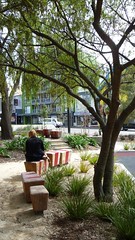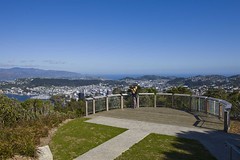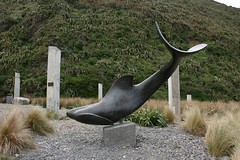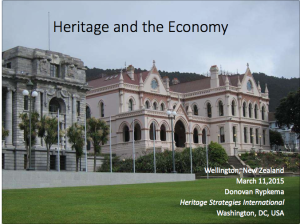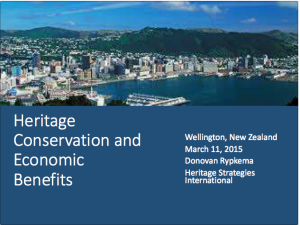We’re back into the rounds of the bi-centennial Civic Trust Awards. The three categories are:
- Enhancement or protection of the Wellington character (built environment)
- The Grant Tilly Memorial Award for preservation projects
- People’s choice – specific artwork/street art/sculptors
The Awards ceremony will be held on 1 December, and hosted by Mayor Celia Wade-Brown.
Submit your nomination here! (Nominations close Friday 13 November)
You can also see previous award winners here.
(The Local Government Commission’s Draft Proposal for Reorganisation of Local Government in Wellington can be found here.)
- Thank you for the opportunity to comment on this. The Civic Trust has long taken an interest in the matter, because of its constitutional purpose of promoting quality in urban design and planning, and the safeguarding and sound development of the built and natural environment which shape the prosperity and distinctive character of the national capital. Throughout this submission, the term “Wellington” means the place as generally perceived from afar, or by citizens of the general region when referring to it from afar. “Wellington” used in these comments does not automatically mean either the historic “‘City of Wellington” or the administrative region defined by dotted lines on maps. “Wellington” is the distinctive part of New Zealand understood by that word; and whose prosperity, character and sustainability any LGC proposals should have at front-of-mind.
- The Wellington Civic Trust agrees that the greater Wellington Region faces major challenges arising from natural hazards, provision of infrastructure, demographic change, economic development and environmental management. We think that the status quo will not best serve the governance and sustainable development of the region in the future. The current boundaries, inherited from the old Municipal and Counties legislation and consolidated in the late 1980s, are not appropriate to deal with the changing demands and pressures facing Wellington in the 21st century. Natural hazards, a narrow economic base, an ageing population and environmental and political issues demand a unified response at a strategic level if Wellington is to thrive as a liveable, smart and prosperous capital city within a vibrant region. We need planning and governance for both the long and short term and for both current and future generations. Strategic governance and planning responses must be at a regional scale and not compromised by current Council boundaries.
- Collaborative decision-making and action by Councils has to date been markedly weak and will not provide for effective and focused responses to present and future challenges.
- Regional communities face important local issues including increasing demands for quality individual and community services, and provision and protection of amenities. These priority local needs must be effectively delivered within the broader context of region wide governance. Thus, the purpose of the Local Government Act 2002, to improve the effectiveness and efficiency of local government, through local community participation and promoting good local government must be effected at both the regional and local levels. It will be critical that the reorganisation and allocation of functions provides ample opportunity for future councils and boards to fully engage with their communities, and at all levels. While acknowledging that the current proposal recognises this important need, the Civic Trust is concerned to ensure that it remains a critical focus in the design and implementation stage. It is all too easy for noble sentiments to be overtaken by notions of managerial efficiency.
- Your draft proposal identifies a number of requirements critical to the effective long term operation of this reorganisation. We believe the full effectiveness of this proposal will only be achieved if the Local Government Commission ensures the following important requirements are implemented in the final outcome of this re-organisation. These requirements are:
- Ensuring an authorative mandate for decisive regional leadership and action.
- The delivery of decisive, clear and strategic stronger regional planning and decision making, while preserving strong local representation and community focus.
- Provision for aligning decision-making with the interests of communities that are directly affected by the decision through effective regional and local consultation and engagement mechanisms.
- Implementing genuine subsidiarity in planning and decision making for local boards. The key requirement is to ensure that decision-making authority is given to local boards on matters of local significance and that funding is available to implement decisions. We strongly support the Commission’s observation in 6.14 that there is broad scope to delegate regulatory as well as non-regulatory responsibilities to local boards. We therefore recommend a review of the relevant section of the Local Government Act 2002 to ensure that arbitrary detail in it is not an obstacle to local boards having delegations for regulatory decisions of local significance.
- Recognising the importance of the contribution from Maori by offering genuine and effective iwi and hapu participation in decision-making in the context of genuine partnership.
- Providing opportunities to lift the region’s national and global competitiveness on the basis of its quality of life and as a wonderful place to live.
- Providing maximum opportunity to deliver benefits from spatial planning, that is effectively aligned and integrated with the financial and statutory responsibilities of national and regional authorities.
- Ensuring the Council and Local Boards are not top-heavy with management, leaving too few staff on the ground who have contact with local communities. There are numerous examples in Auckland City of Council managers not knowing what other managers are doing of relevance to their particular responsibilities. E.g. the Council Parks Manager being directly (and publicly) contradicted by the Central Manager of Local and Sports Parks in relation to the upkeep of St Patrick’s Square.
- It is essential for the new Council to have sufficient authority to ensure it has fully effective control and accountability of all Council-controlled organisations. As to this last point, there are numerous examples emanating from Auckland Council to demonstrate a total lack of accountability of CCOs to the elected Council. For example, the Ports of Auckland Company appearing to act without mandate from or notice to the elected Representatives to demolish the end of Marsden Wharf, and to expand wharves and reclaim significant portions of the Waitemata harbour.
- Please let me know if you would like any further information or amplification. If there is an “oral hearings” stage, we request to take part.
The Trust’s Avenues and Oases seminar, held Saturday 18 October, was filmed and a documentary of proceedings and interviews with keynote speakers has been completed. Watch this 30-minute record of the city and hear exciting ideas about achieving its potential as a creative, lively and liveable capital city here:
You can read our submission on Greater Wellington’s Draft Natural Resources Plan here.
A public seminar hosted by the Wellington Civic Trust
Saturday 18 October 2014, 9 am to 1 pm
To be put in the diaries of all who are interested in urban design and wish to explore the potential for uplifting the appearance and amenity of two prominent features in the capital’s cityscape: Taranaki Street and Kent and Cambridge Terraces – Wellington’s main north–south corridors.
The keynote speaker will be the eminent film director Gaylene Preston, longtime resident of Mount Victoria.
The Trust’s objective is to promote the development of a formal structure plan for this link within the central city. Such a plan would identify and protect opportunities to develop high quality public spaces and avenues in our city.
The venue will be Rutherford House, on the corner of Lambton Quay and Bunny Street, the home of Victoria University’s Commerce Faculty. The University has kindly agreed to provide its facilities.
Watch this space for further details.
Submission to Parks and Gardens (REPLOI), Wellington City Council
Introduction
- The Wellington Civic Trust is in broad agreement with the direction of most of the provisions in the draft Bill.
- The Trust is appreciative of the time and effort devoted over a long time by Councillors and Council staff to reaching this stage of the legislative process.
- The Trust wishes to make oral submissions.
Balance in Decision-Making Powers
- Looking, however, at the balance of provisions in the draft Bill, it does appear that greater weighting has been given to administrative convenience and flexibility. This seeming to be at the expense of the citizens of Wellington having the ability to question and challenge decisions made by the Council, and by Council staff exercising delegated authority.
- It is considered, therefore, that the draft Bill needs to be altered to give greater facility to achieving a collective approach between the Council and the citizenry in overseeing the management of the Town Belt and in protecting its integrity.
- To achieve such a balance it is considered to be imperative that the discretionary powers to be bestowed on the Council by legislation be precisely confined and defined and set out preconditions that must be met before the decision-making powers are exercised.
Interpretation
- To achieve a greater balance between the Council and the citizens, it is suggested that the interpretation provision which defines the meaning of Council be enlarged to refer back to the 1873 Deed that defines the then Corporation, now the Council, as the Mayor, Councillors and citizens of the city of Wellington.
Legal Status – clause 9
- It is suggested that the wording of clause 9(1) be changed to read:
“The Council holds the Wellington Town Belt as Trustee of the Charitable Purpose Trust created by the Town Belt Deed of 1873 for the citizens of Wellington in their capacity as beneficial owners.”
Definition of Public Recreation Ground – clause 9
- The definition could be extended to recognise heritage features. Clause 9(3)(b) could read:
“The protection of the natural environment and heritage features”
Principles – clause 10
- In stating that:
“the Wellington Town Belt should be protected and enhanced for future generations”
clause 10 highlights the gravity and farsightedness of the founding ideals and therefore needs to make these the first point of reference in the evaluation of each of the subsequent principles. - Accordingly, clause 10(2) could state:
“All principles shall be subject to the overriding purpose of principle (a).” - Community participation needs greater and unequivocal emphasis. Clause 10(1)(g) could read:
“Community participation in the management and protection of the Wellington Town Belt must be in a manner that is collaborative and inclusive and provides for citizens’ engagement in all strategic decisions of Council on substantial issues.”
Application of the Public Works Act 1981 – clause 14
- Clause 14(3)(b) could be extended to read:
“The Council must seek appropriate compensation, according priority to land of at least equivalent value.”
Powers of the Council – clause 16
- Unless there are compelling reasons to the contrary, the phrase “or business” should be deleted from the draft Bill in clause 16(1)(a), which gives Council powers to have full capacity and subsequently in clause 16(1)(b) full rights, powers, and privileges.
- For clarity and to ease the concern of the public, a further subclause (4) could be added to clause 16:
“(4)(a) provided that the construction of any significant building or fixture shall be fully publicly notified as required by clause 21(1)(d), except when full public notification is required by other legislation; and
(b) no restriction on public access shall unnecessarily compromise the principle of the Wellington Town Belt being accessible and for all to enjoy as required in Principle 10(1)(e).”
Restrictions on Council’s Powers – clause 17
- The open-ended wording of clause 17(c)(i) and (ii) concerning for-profit use of the Wellington Town Belt is regarded as being far too imprecise.
- It is the Civic Trust’s view that most Wellingtonians would be repelled and outright angry at the prospect of any part of the Town Belt being given over to permanent or mid- to long-term commercial activity.
- It is the Trust’s view that any for-profit activity needs to be confined to temporary special events, with any structure or fixtures being removed afterwards.
- Accordingly, it is suggested that clause 17(c) be reworded to:
“the Council has no power to…
(c) allow any for-profit use of the Wellington Town Belt—
(i) unless that use is solely temporary; and
(ii) unless it is associated with a special event; and
(iii) unless all associated structures and fixtures are immediately removed after that special event; and
(iv) unless the public are given 60 days’ advance notice and invited to submit objections with the valid reasons for these objections; and
(v) unless the Council gives due consideration to these objections and either imposes appropriate conditions or declines permission; or
(vi) if the exercising of that qualified power would unnecessarily compromise the principle of the Wellington Town Belt being accessible and for all to enjoy as required in Principle 10(1)(e).” - It is acknowledged that these “positive tests” to be applied to the exercise of a discretionary power may be viewed as pedantic and overly onerous. However, it is the Trust’s understanding that a series of mutually reinforcing positive tests is essential if the public wishes to pursue before the Courts a Judicial Review of a decision made in exercising discretionary powers bestowed by a statute.
- By comparison, it is understood that “subjective tests” such as would be applied by the Court to the “open-ended” provisions such as those in the present draft would provide no grounds whatsoever for the Court to evaluate the administrative processes followed. In other words, the protections embodied in the Judicature Amendment Act could not provide any redress. Thus the open wording of the draft Bill would render all decisions made by the Council and by Council staff effectively unchallengeable.
- There are possibly therefore issues of natural justice that arise from there being so untenable statutory powers having been bestowed by Parliament.
Leasing and Licensing – clause 18
- In our earlier submission we supported the eight-hectare limit. After further reflection, we consider that the eight-hectare limit on leasehold land within the boundaries of the Town Belt is inappropriate.
- The current area is thought to be 5.9 hectares, as stated in section 6.4.2 of the now authorised Town Belt Management Plan of August 2013.
- Considering that the most valued land within the Town Belt is that which is flat and easily accessible, and that such land is scarce in such a hilly and confined terrain, the limit of eight hectares risks the allocating of all this scarce land to being entirely in leasehold.
- It is seen as being of primary importance that the availability of leasehold land be restricted so that there will always remain an inbuilt imperative to encourage joint use of the scarce flat and therefore easily accessible land.
- Most of the Town Belt flat land is close to or adjacent to residential areas. As the population of the central city intensifies, the amenity value of this scarce resource will increase rapidly.
- Accordingly, the Trust suggests that a sustainable proportion of Town Belt land available for leasehold be confined to no more than: six hectares.
- Clause 19 could be augmented as follows:
“(3) Easements and rights of way must be granted only as a last resort after exhausting all alternatives.
(4) The Council has no power to grant any easement or right of way for a private purpose.” - These provisions would ensure that such concessions must be an exception to the rule.
Consultation – clause 21
- For the purposes of ensuring that the Council keeps publicly available records on how each submission was evaluated, clause 21(1)(b) should be augmented by a new sentence stating that a record should be kept of how each submission was evaluated.
Town Belt Management Plan – Requirement to Appoint a Curator
- The Civic Trust is cognisant of the views of Council’s senior managers that the management and protection of the Town Belt, of necessity, requires the application of a wide range of management responsibilities and skills.
- From a non-institutional perspective, however, there is much merit in there being one senior Council staff member who is formally designated as the point of contact for the public to have access to in the first instance. Should there be local government amalgamations, the merit of having a Curator would be even more relevant.
- This formal appointment under the statute would make it plain that the role is to be one of liaison between the public and the Councillors and their senior advisors.
- Accordingly it is suggested that a further clause 21(3) be included in the draft Bill, namely:
“As Trustee the Council will ensure that at all times a senior Council manager is designated as the Curator or alternatively Guardian of the Wellington Town Belt, and that this role is to be one solely of liaison for the citizens of Wellington to have a one-person contact on all issues relating to the Town Belt.”
Appeal Provisions
- Considering the limitations of the Judicature Amendment Act and the exclusion of the limited protections available under the Reserves Act, the proposed Bill should ideally contain clauses that will provide the citizens of Wellington with an avenue for pursuing challenges to decisions made by the Council.
- The Civic Trust has yet to identify the most appropriate public office for performing this critical safeguard. Possibilities include the Minister of Conservation outside the provisions of the Reserves Act; the Auditor-General; the Ombudsman; the Local Government Commission; or a retired Judge of the High Court appointed by the Chief Justice.
- For the appeal authority to be effective, there would need to be a statutory power to not only overturn a decision of the Council but to impose an alternative decision.
Craig Palmer, Board member
for Alan Smith, Chair of the Wellington Civic Trust
Contact details
Toni Izzard, Deputy Chair, phone 027 5480 989, email tizzard@eqc.govt.nz
Craig Palmer, phone 385 0366, email palmerspring@actrix.co.nz
WELLINGTON CITY COUNCIL
ENVIRONMENT COMMITTEE
FURTHER SUBMISSION:
SUGGESTED ADDITIONAL
CLAUSE IN TOWN BELT BILL
The Civic Trust requests the Council’s Environment Committee to consider the following additional clause:
“The Council has no power to:
17(d) enter into a memorandum
of understanding or any
kind of legally binding
agreement applicable in
any way to the Town Belt,
withut adhering to all
the requirements of
section 21 governing
consultation”
Craig Palmer
For Alan Smith, Chair







